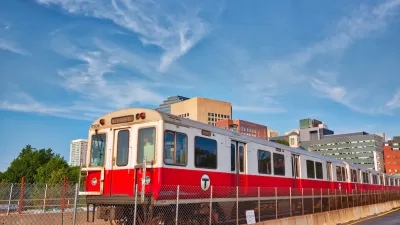The nation's second-largest transit system—and one of its newest—persists in the face of a host of challenges exacerbated by the pandemic.

Jake Blumgart interviews Zachary Schrag, author of The Great Society Subway, about the history of the ambitious Washington Metro system, which Blumgart calls "arguably the only comprehensive rapid transit system built in America after the rise of mass car ownership."
According to Schrag, officials at the time of its construction in the 1970s hoped it would provide a model for other cities. From its inception, the system had to compete with driving by providing ample amenities and attempting to serve both regional commuters and urban residents. Schrag notes that Metro committed to a more transit-oriented approach than other cities, making transit more convenient and raising the cost of driving and parking. Cities that build highways and parking alongside transit reduce the incentive to take public transportation and make the built environment less friendly to walking and biking.
Today, the system may struggle to accommodate new travel patterns. "What heavy rail is really, really good at is getting a lot of people to the same place at the same time," says Schrag. The challenge of providing service at off hours may only grow as work and mobility behaviors change.
Ultimately, says Schrag, massive infrastructure projects like Metro—or the Brooklyn Bridge, or the Erie Canal—require major investments in the future that Americans seem less willing to make.
FULL STORY: Lessons from Washington Metro, America’s Last Great Subway System

Maui's Vacation Rental Debate Turns Ugly
Verbal attacks, misinformation campaigns and fistfights plague a high-stakes debate to convert thousands of vacation rentals into long-term housing.

Planetizen Federal Action Tracker
A weekly monitor of how Trump’s orders and actions are impacting planners and planning in America.

San Francisco Suspends Traffic Calming Amidst Record Deaths
Citing “a challenging fiscal landscape,” the city will cease the program on the heels of 42 traffic deaths, including 24 pedestrians.

In U.S., Urban Gondolas Face Uphill Battle
Cities in Latin America and Europe have embraced aerial transitways — AKA gondolas — as sustainable, convenient urban transport, especially in tricky geographies. American cities have yet to catch up.

Detroit Says Problems With Property Tax Assessments are Fixed. Advocates Disagree.
With higher-valued properties under assessed and lower-valued properties over assessed, advocates say there's still a problem with Detroit's property tax system.

Defunct Pittsburgh Power Plant to Become Residential Tower
A decommissioned steam heat plant will be redeveloped into almost 100 affordable housing units.
Urban Design for Planners 1: Software Tools
This six-course series explores essential urban design concepts using open source software and equips planners with the tools they need to participate fully in the urban design process.
Planning for Universal Design
Learn the tools for implementing Universal Design in planning regulations.
Heyer Gruel & Associates PA
JM Goldson LLC
Custer County Colorado
City of Camden Redevelopment Agency
City of Astoria
Transportation Research & Education Center (TREC) at Portland State University
Jefferson Parish Government
Camden Redevelopment Agency
City of Claremont





























